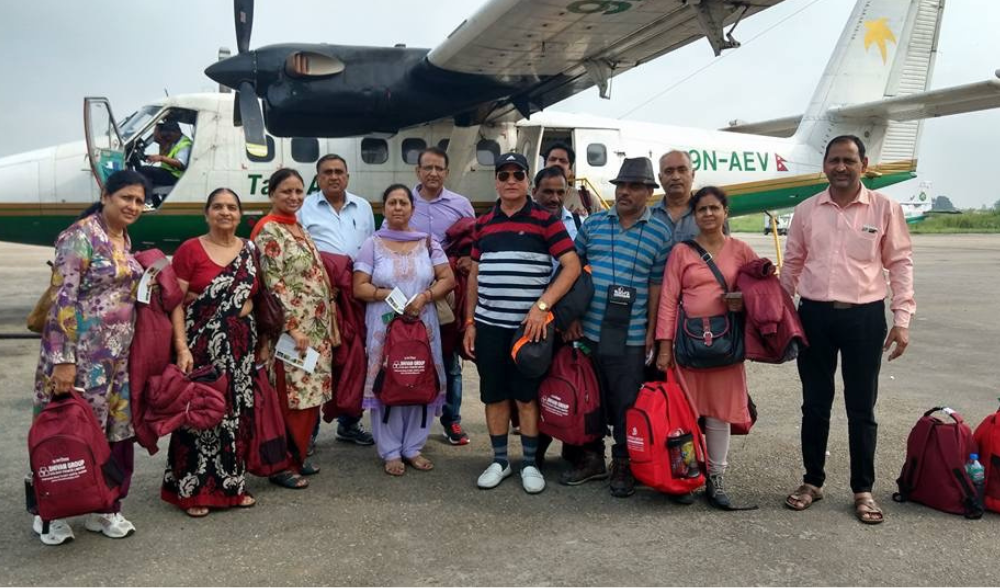Lazimpat, 02 Kathmandu Nepal
Newsletter
Shivam Group have activities

The Religious Yatra can vary widely based on the specific destinations and faiths, sentiments and emotion involved. The term “YATRA” is derived from sacred Hindu language Sanskrit which means pilgrimage or journey to holy places. Such places can be anywhere which is correlated with Hindu legends like The Ramayana or The Mahabharat or more. The person who performs this journey is called Yatri. According to Hindu mythology, it is believed that Yatri who visit such sacred places after enduring all the hardship of the journey will have their soul purified and will be able to attain “moksha” (another Sanskrit word which means a state of eternal peace) after their death. Generally, Yatra Nepal is ventured in groups so, that everyone will be able to help each other in their journey.
Yatra Nepal is one of the biggest and the long-lasting sacred journey that occurs frequently in Nepal. Each year thousands and thousands of Yatri visit to the sacred places in groups. As a leading Yatra operator with in Nepal, Tibet and Bhutan, Shivam Group has been providing Yatra journeys to various places in Nepal as well as foreign countries.
Moreover, Yatra Nepal can last for several days and in between different kinds of problems can arise which can slow down the journey and that is where we Shivam Group can save the day. We look after each and every single client with individual care and attention. We have a team that is trained in safety and first aid as well as high altitude rescues. We have designed our Yatra Nepal package for our Yatris to enjoy the amazing diversity of countries and culture the world has to offer. Besides we have teams who are highly experienced professionals who strive to give their best and always aim to meet the expectations of the Yatri by ensuring a premium level service.
Currently, Shivam Group is providing following Yatra Nepal and Tibet
Holy Sites: Visits to sacred places associated with a particular religion, such as temples, churches, mosques, synagogues, or pilgrimage sites.
Pashupatinath, Muktinath, Damodar Kund, Kailash Mansarovar Many more site.
Historical Cities: Exploration of cities with deep religious history and cultural significance.
Religious Festivals:
Participation: Inclusion of religious festivals or events, offering a firsthand experience of local traditions and celebrations.
Cultural Immersion:
Local Customs: Opportunities to learn about and participate in local religious customs and practices.
Cultural Performances: Attendances at religious ceremonies, rituals, or cultural performances.
Pilgrimages: Sacred Journeys: Pilgrimages to revered destinations, often involving rituals like circumlocution, prayer, and meditation.
Guided Tours: Facilitation by knowledgeable guides who provide insights into the religious and historical significance of each site.
Educational Components:
Lectures and Talks: Educational sessions on the history, philosophy, and teachings of the specific religion.
Interfaith Dialogues: Opportunities for participants to engage in discussions and learn about different religious perspectives.
Accommodations:
Pilgrim Accommodations: Stays in lodgings catering to pilgrims’ needs, often in close proximity to religious sites.
Logistics:
Transportation: Arrangements for travel between destinations, including flights, buses, or other modes of transportation.
Meals: Provision of meals, considering dietary preferences and religious dietary restrictions.
Customization: Tailored Experiences: Some tours may offer customization, allowing participants to focus on specific aspects of the religious journey.
Spiritual Guides: Leadership: Presence of spiritual guides or leaders who provide guidance and facilitate religious practices.
Group Dynamics: Community: The opportunity to share the experience with like-minded individuals, fostering a sense of community.
Before embarking on a religious tour, it’s essential to research and choose a reputable tour operator, consider travel logistics, and be mindful of cultural sensitivities. Additionally, understanding and respecting local customs and traditions contribute to a more meaningful and respectful pilgrimage experience.